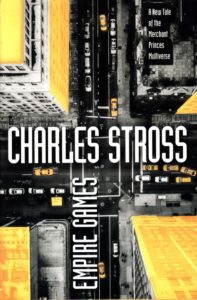“Empire Games” by Charles Stross
 I’ve never read any Charles Stross before, but he’s been on my wishlist for a very long time, so I was excited to read this book. It’s set in the world of his Merchant Princes (also known as Family Trade) books, but it’s the start of a new series. I had high hopes, but I ended up being a little underwhelmed.
I’ve never read any Charles Stross before, but he’s been on my wishlist for a very long time, so I was excited to read this book. It’s set in the world of his Merchant Princes (also known as Family Trade) books, but it’s the start of a new series. I had high hopes, but I ended up being a little underwhelmed.
After terrorist “world walkers” from an alternate timeline nuked the White House, the U.S. has become a paranoid surveillance state. Rita Douglas is the adopted daughter of a family that knows how to keep their head down and out of trouble – her grandparents escaped from the GDR and outwitted the Stasi. Unknown to her, the U.S. government has been keeping tabs on her since she was eight – her birth mother was a known world walker and she has the gene as well. She’s recruited to become the first American world walker spy. Meanwhile, her birth mother is trying to rebuild modern technology in an alternate timeline while waiting for the inevitable U.S. first contact.
There are a couple of reasons why I didn’t love this book, the biggest one being that I just didn’t believe the picture that Stross painted of the timeline closest to our world. It was the same until 2003 when the nuclear attack on the White House happened, but since then, the Bill of Rights has become a farce, conservative values have taken root (Roe vs. Wade was overturned), society is more overtly racist and homophobic, and India and Pakistan have had a nuclear war. Surveillance is everywhere – every street corner has a camera, and there are advanced algorithms to identify suspicious people.
The danger of setting up an alternate reality that diverged only a few years ago is that it will inevitably ring false to many people. Everyone has opinions about the times they live in. I just couldn’t believe that Americans would give up privacy or civil liberties to such an extent, or that our increasingly liberal world would suddenly descend into a moral panic about race or homosexuality. And India and Pakistan having a nuclear war struck me as exceedingly unlikely – there’s no political gain to either country going to war (much less nuclear war), and I don’t think there would be popular support for war at all (from having grown up in India.) References to “President Rumsfield” implementing draconian surveillance measures, and far too many references to the “Defense of Marriage Act” made me suspicious that the author was using the story as kind of a dumping ground for his politics.
The story and characters were fine, but they were inseparable from the world, so it made me hard to get invested in them. The tone of the book is an old school spy/tradecraft story, with much lamenting about skills lost after the Cold War ended. Without the world being what it is, I have no idea who Rita would be. Miriam and her timeline are much more interesting – the problem of introducing modern technology rapidly to a society with old fashioned values is fascinating, and I liked seeing the glimpses of how that was being implemented.
The book uses omniscient narration, including things like behind-the-scenes transcripts from Rita’s handlers, and that meant there was very little tension in the story. There was no real anxiety about Rita’s mission to the other timeline because we’ve been following the other timeline through Miriam and we know they’re fairly nice people. Rita’s contentious relationship with her handlers could have been a lot more ominous, but we’re reading their transcripts and we know they’re well-intentioned even if they occasionally misjudge her. There are hints of a larger threat established, but since they haven’t been encountered at all so far, that doesn’t add much excitement either.
I’m not saying this was a bad book – it was well written and well executed for what it wanted to be. What it wanted to be just wasn’t for me.
